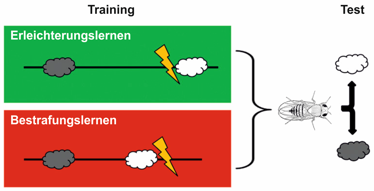Project B11
Parceling out the sites and mechanisms of reward-, relief- and safety-memories in Drosophila

Prof. Dr. Bertram Gerber
The dichotomy of search/approach versus escape/avoidance is fundamental to motivated behaviour. We study how six different kinds of memory modulate this balance. This is of translational importance as they define independent opportunities for interference. There can be three different kinds of memory for learned approach: animals and man alike approach a cue if it predicts i) reward, ii) relief from shock, or iii) shock-absence. In turn, learned avoidance can be based on memories predicting iv) shock, v) loss of reward, or vi) absence of reward. We study the organization of these six processes in Drosophila, focussing on the evolutionarily conserved Synapsin protein, and the mushroom body, a ‘cortical’ brain region of insects.

Flies can associatively learn that an odour predicts either the onset or the offset of an electric shock. When the odour is presented upon shock offset, at the moment of 'relief', they will later on approach such a relief-associated odour (relief-learning; german Erleichterungslernen). In contrast, flies avoid odours previously associated with shock onset (punishment learning, german Bestrafungslernen).